The Last Stand for UN Legitimacy In Its 79th General Assembly Cycle
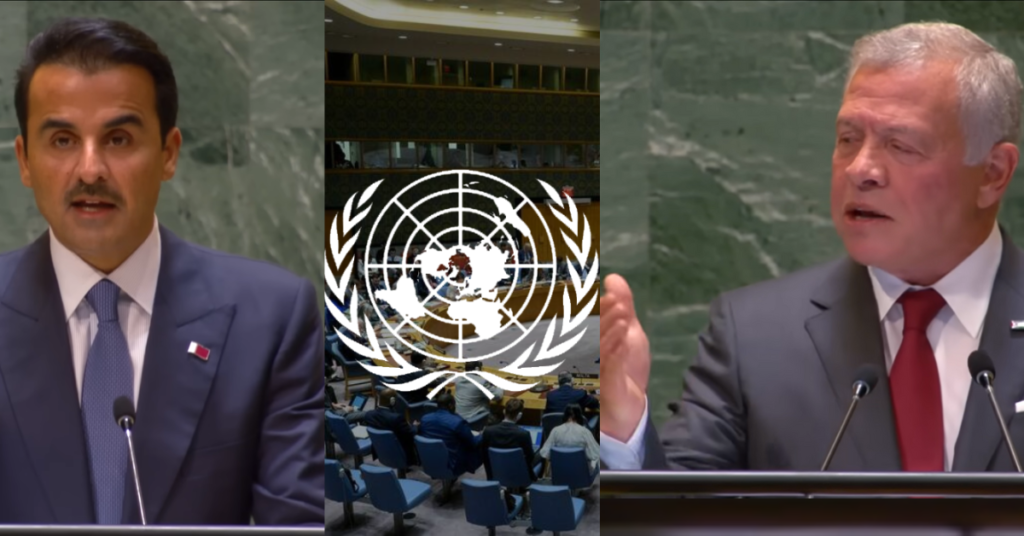
By: Yara Marei, Arab America Contributing Writer
In the grand hall of the United Nations, King Abdullah II of Jordan spoke with a rare intensity, his voice echoing decades of frustration. As he addressed the 79th session of the UN General Assembly, he declared, “Our United Nations is facing a crisis,” questioning the organization’s ability to uphold justice. Moments later, Amir Tamim bin Hamad Al Thani of Qatar took the podium, his words equally sharp. He condemned the global community’s failure to protect Palestinian rights, framing it as a moral failure that threatened the UN’s relevance. Together, these leaders didn’t just criticize. They issued a final plea for the UN to act decisively or risk losing its very legitimacy in the eyes of the world. Their speeches were not just about peace but a call to rescue global diplomacy from collapse.
Both leaders’ speeches felt like a battle call for peace, their frustration directed at a global system that, in their eyes, had failed to deliver justice for the oppressed. They called on the international community to confront its complicity in allowing injustice to continue. As their voices reverberated across the chamber, they left the world with a stark choice: act now or risk watching the last vestiges of global legitimacy fade away!
About The UN General Assembly UNGA
Arab leaders took center stage at the 79th session of the United Nations General Assembly (UNGA), held at the UN Headquarters in New York from September 22 to 27, 2024. Their speeches stood out as powerful calls for action and peace, framed as possibly the last chance to preserve the UN’s legitimacy. This urgency is what gives this meeting its significance, making it a moment that could truly impact those living through war. The theme was emphasized particularly in the speeches of King Abdullah II of Jordan and Amir Tamim bin Hamad Al Thani of Qatar, both of whom underscored the critical need for the UN to act decisively.
King Abdullah II’s Perspective of the UN
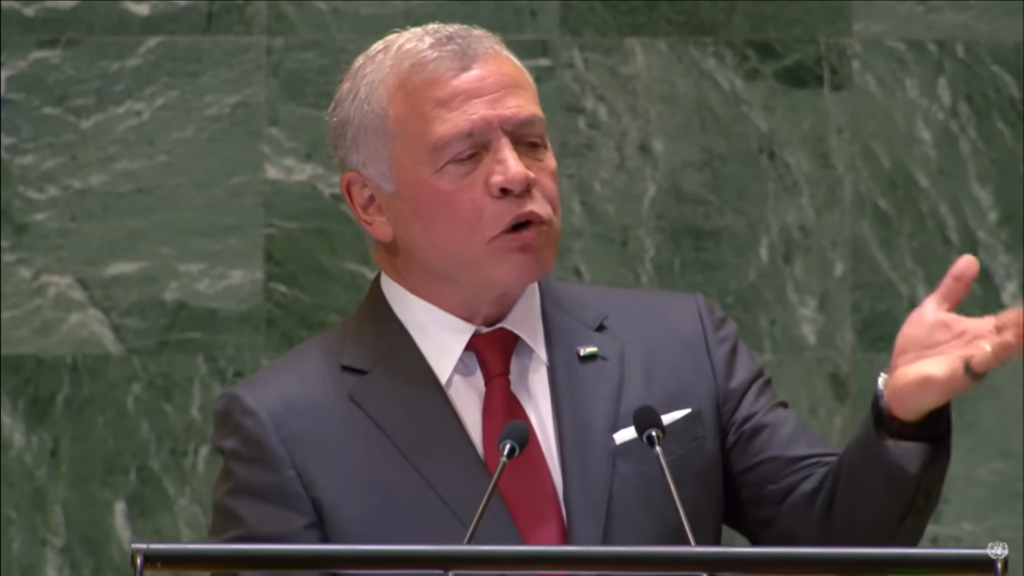
King Abdullah II began his speech with an angry tone, questioning the legitimacy of the United Nations and its ability to address pressing global issues. He directly stated, “Our United Nations is facing a crisis that strikes at its very legitimacy and threatens a collapse of global trust and moral authority.“ His words reflected deep frustration, suggesting that if the UN is merely a platform for speeches without real action, particularly in resolving the issue of Palestine, then such meetings are futile.
His Majesty’s speech made it clear that he sees the current state of international diplomacy as crumbling, especially in the face of injustices like those faced by Palestinians. He warned, “The reality is that some nations are above international law. That global justice bows to the well of power, that human rights are selective privileges to be granted or denied.” The King’s voice, filled with both anger and sympathy, indicated that this was a last-straw plea for peace. “We cannot stand for that, and we must recognize that undermining our international institutions and global frameworks is one of the greatest threats to our global security today.”
King Abdullah reaffirmed his commitment to peace, stating, “I grew up a soldier in a region that is all too familiar with conflict, but there is nothing familiar about this war and the violence unleashed since October 7,” highlighting that this is the fastest mortal rate caused by hunger and starving in Gaza. Yet he accused Israel of repeatedly breaking peace, year after year, noting, “Over and over, we have watched Israel try to achieve security through military means. Escalation is followed by a pause until the next deadlier one.” “While Israel is propagating the idea of being the most democratic country in the Middle East, it is easily diminished when Palestinians are experiencing this firsthand.”
King Abdallah II made it clear that he could no longer tolerate “the unprecedented scale of terror unleashed” by the Israeli government, marking a pointed criticism of their actions. His condemnation of the crimes in Gaza and the West Bank was sharp, as he expressed outrage over the relentless violence against Palestinians, saying, “More than 42,000 Palestinians have been killed since October 7. Is it any wonder that many are questioning how this war cannot be perceived as deliberately targeting Palestinians?”
The War From The Jordanian Perspective
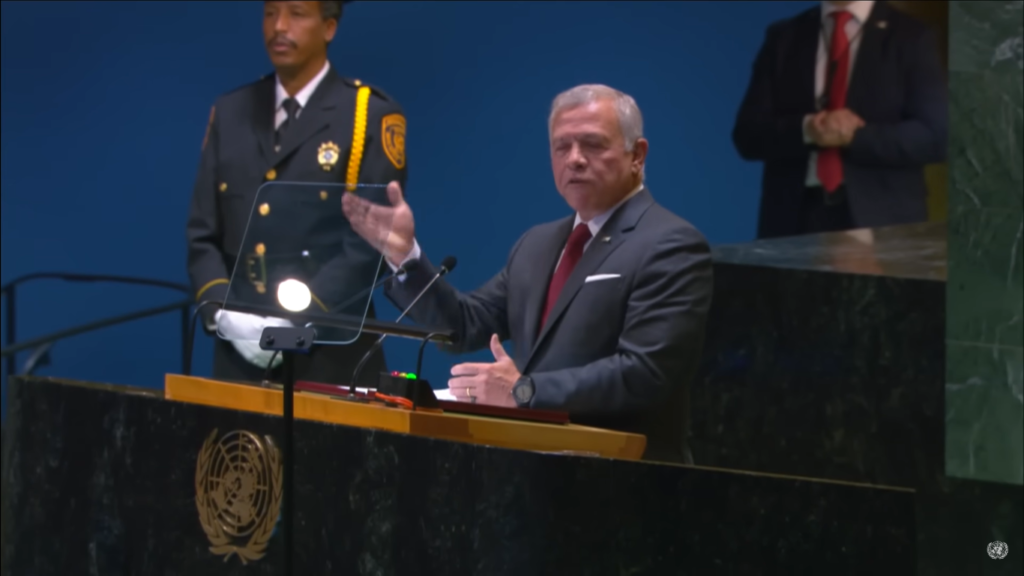
He also addressed the extremist idea propagated by Israelis that Jordan could serve as an alternative homeland for Palestinians. The King strongly rejected, “Be very, very clear: that will never happen. We will never accept the forced displacement of Palestinians, which is a war crime.” Allowing Palestinians to be displaced to Jordan, he warned, would amount to ethnic cleansing, and he emphasized that Jordan would never support such an act.
Throughout his speech, King Abdullah stressed the importance of international law and accountability as the only way to achieve lasting peace. He argued that this meeting of the UN should result in concrete actions to protect Palestinian lives. The King concluded his speech by recalling the memory of his father, King Hussein, who had spent his life fighting for peace and who also attended UN sessions for many years, emphasizing that Jordan’s commitment to peace is unwavering.
King Abdallah echoed his father’s words from 64 years ago, especially in the UGNA 15th cycle, stating, “I pray this community of nations has the courage to decide wisely and fearlessly.” He affirmed that Jordan would choose peace over war but will never surrender the future to the party that already chose war over peace and already proceeded with it, with clear threats to Israel, as the one who chose war over peace, by which, threatening the future of both Palestinian children and children all over the world.
Amir Tamim’s Powerful condemnation
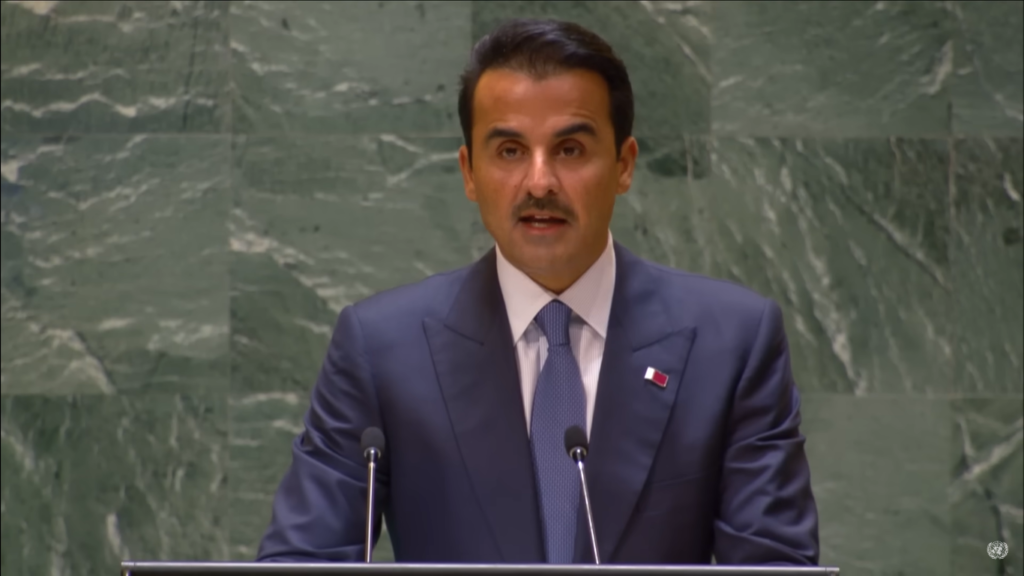
Amir Tamim bin Hamad Al Thani of Qatar delivered a powerful speech addressing the ongoing atrocities faced by Palestinians, painting a vivid picture of how advanced the weapons of Israel are. While the Palestinians are all prisoners either in the West Bank or Gaza and have nothing to fight with except their faith, He strongly condemned Israel’s justification of its actions, calling them crimes of genocide, not just warfare. “This is not a war with the well-known and common concept of war, but it is a crime of genocide through the most sophisticated weapons against the people.”
The Amir highlighted a disturbing global indifference, emphasizing that it is seemingly easier for the world to forget about Palestine, allowing the Palestinians to die in silence. By this, the global community intends to delay ceasing fire and ending the war so that more Palestinians are killed, helping the Israeli aim of ending the Palestinian race. “It is no longer tenable to talk about Israel’s right to defend itself in this context without being complicit in justifying the crime.” He accused the international community of complicity in Israel’s actions by failing to intervene, posing the question: Is this what the world truly wants? Is the death of the Palestinian people the price the world is willing to pay for the occupation to continue?
Thus, Sheik Tamim highlighted that this could never be a justified and fair solution for Palestinians while forcing the world into the solution that Israel chose in killing the Palestinians, and he described all of what is happening in this war as failed trials that end the Palestinian race so that the resistance ends. “There is no way for the resistance to end and for Palestine to be forgotten except in either case: ending the occupation or the death of the Palestinian race, and that is the obvious choice by the global community by delaying ceasing fire!”
The UN From the Qatari Perspective
The Amir argued that the world has chosen to facilitate the slow eradication of Palestinians, with global powers deliberately delaying a ceasefire. He framed this delay as aiding Israel’s aim of erasing the Palestinian race: “It seems there are those in Israel who entertain wishful thinking to eliminate the Palestinian people.” He warned that this approach is not only out of justice but a dangerous and unacceptable “solution” that the international community should reject outright. He emphasized, “But this will never happen, because the Palestinian cause is resistant to occupation because it is an issue of the native people on their land.”
In a sharp metaphor, Amir Tamim bin Hamad Al Thani compared this war to “a mercy bullet into the heart of international legitimacy,” criticizing how the principles of justice established after World War II are being dismantled. He pointed out that the failure to learn from history is leading the world towards greater wars and bloodshed, stating, “The consequences of this approach are visible before our very eyes, yet it seems some are still trying to find a way to perpetuate the war without addressing the root causes.”
Sheik Tamim also raised concerns about the future of Gaza, warning that Israel’s long-term plans might involve ruling Gaza through illegal or terrorist organizations “whether this kind of ruling is legal or illegal, law-based or non-law-based.” This, he argued, would only serve to further destabilize the region. Additionally, he condemned Israeli attacks on southern Lebanon and the ongoing conflicts in Syria and Yemen, calling for an immediate halt to the violence and the need for comprehensive peace efforts.
In his closing remarks, Amir Tamim bin Hamad Al Thani reaffirmed Qatar’s commitment to supporting the Palestinian people, stressing that the occupation will only end when Palestinians are granted their legitimate rights. He urged the international community to take concrete steps towards ending the occupation, stating, “The establishment of an independent Palestinian state within the borders of 1967 is a just and permanent solution in the interest of both the Israeli and Palestinian peoples.”
Some absence is way loader!
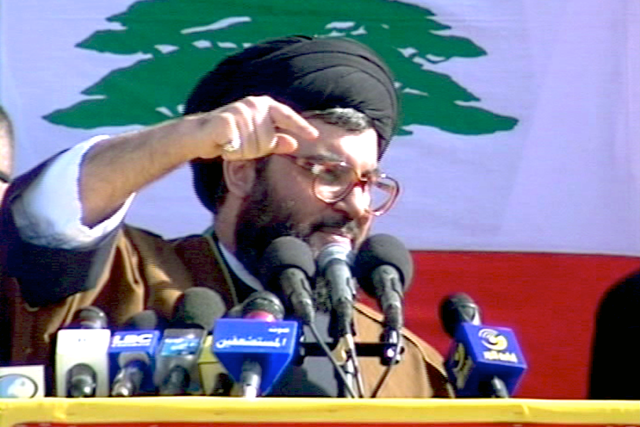
At the same time, the Prime Minister of the occupying state had been delivering his speech of lies just two minutes before giving the green light to bomb Beirut and target Hassan Nasrallah, the principal executive secretary of Hezbollah. Nasrallah is a symbolic leader of the resistance, not only for Arabs and Muslims, including both Sunnis and Shias, but also for Christians and non-Zionist Jews who are all united by blood and history.
Ironically, Nasrallah’s speeches are memorials in such events as the United Nations by his enemies, and he will be forever remembered with his speeches and voices of pride, freedom, and liberation with full strength of standing for rights and the pride of the Arab Muslim identity. With each act of aggression against him, Nasrallah only becomes more glorified, and He is very lucky to receive this hate from the leader of the terror group who has been given the UN podium. This brings the question: Is the Last Stand of UN legitimacy still valid, or has it already ended if one of these terrorist leaders begins a speech while orchestrating the deaths of countries’ symbols?!
See our blog here!








